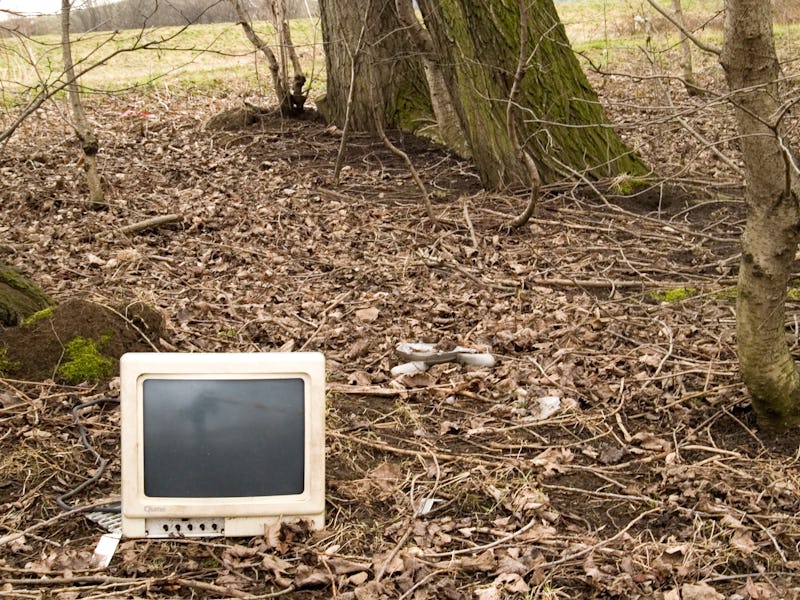WTF Is the Technosphere? The Anthropocene?There's No Word for the Manmade World
Some scientists believe the language in their field -- "novel ecosystems," "technosphere" -- is due for a change.

Every high school kid knows what an ecosystem is, but ask them about the waste- and manufacturing-centric ecosystems that have sprung up since the industrial revolution and they’ll look at you funny. Ask them about new, Anthropocene ecosystems and they’ll groan. Ask them about novel ecosystems and they’ll go back to Snapchatting. Ask them about the technosphere and you’ll find yourself alone.
Students aren’t being taught how to talk about the systems that define the parameters of life on Earth because scientists aren’t really sure how to have that conversation.
Novel ecosystems are ecosystems that aren’t naturally occurring. They are generally engineered by humans or created as the result of human actions. Elements of these systems can be as different as rich soils created by domesticated livestock relieving themselves and nuclear waste. These systems can include invasive species transported on boat or viruses transported by plane. They can incorporate steel workers and Apple factories. In short, these are the natural processes triggered by unnatural processes.
Something like the atmosphere is a global system that has interactions all across the world and we can think of it as naturally occurring. But something like the global cold chain — the planet-spanning, human-engineered system that keeps things refrigerated — that’s a human system that has proved disruptive to the natural ecosystem. In a sense, considering ecosystems without human involvement is like doing Newtonian physics without the variables. You’ll get a basic notion of how things work, but it will be inexact. This is why the idea of novel ecosystems arose and why it serves as an umbrella for more specific notions.
The technosphere is the novel ecosystem created by technologies interacting with the natural ecosystem, or biosphere. It’s a term that is finding traction with some researchers as hardware proliferates, but its meaning remains slippery. Though the concept has been around for several decades, some scientists have distanced themselves from any jargon that seeks to make a distinction between novel ecosystems from organic ones.
“I intentionally don’t use the term,” said Dr. Erle Ellis, a professor of Geography & Environmental Systems at the University of Maryland. “I feel like it’s misleading, it misrepresents the concept, and I don’t want to be associated with it. The concept can be useful in addressing the idea that ecosystems are dynamic and don’t have natural stability, that they’re always changing. Ecosystems don’t stay the same. A lot of us say everything is a novel ecosystem.”
Ellis believes novel ecosystems and the technosphere are implied by the term Anthropocene. His argument is basically that humanity’s impact on our environment is inherently technological, the creation of creations. Technosphere parses that to mean high-tech inventions, but there is literal difference to a butterfly. Ellis authored a paper in Ecological Monographs last fall exploring the impact of human society on transforming the biosphere and arguing that understanding human sociocultural processes is as crucial as understanding sciences like biology or geophysics.
“I think it’s been a very exciting time for this field,” Ellis said. “The most important concept has to do with age, how long you’ve seen novel ecosystems in different parts of the world. If you look deeply you can see them all over, perhaps even thousands of years old, and that kind of blurs the definition. I mean, urban settlements are nothing new.”
So whether or not you believe in the technosphere as a discrete concept is partly contingent on what you define as technology, and whether you believe humans have always been in the business of altering their surroundings or whether the practice, to the extent that it’s had any real impact, is new.
“I find it somewhat misleading,” said Melinda Zeder, a Senior Research Scientist and Curator of Old World Archaeology at the Smithsonian Institution who also objects to the term technosphere. “That discussion tends to focus on the present day, but if you go back further in time, I think what we’re dealing with when we talk about the Anthropocene and human impact and manipulation of the environment is a very deeply rooted phenomenon that really stretched back to actions our species has taken over a long period of time.”
Humans had a lighter environmental footprint during the Paleolithic era, which escalated in the modern era with an increasing ability to spread and manipulate environments, causing extinctions and dislocations. Some scientists date the beginning of the anthropocene to the detonation of the first atomic bomb, a classification that’s wrong-headed from Zeders perspective. Rather, she believes the Anthropocene — and novel ecosystems and the technosphere, if those are the terms you’re using — is rooted much deeper in time. That’s the argument of a paper Zeder co-authored in Proceedings of the National Academy of Sciences paper published this week.
“So much of the discussion now is about where to draw that threshold line, and that’s a misdirected questions. Maybe geologists have to focus on that, but mostly we really need to focus on how humans do shape ecosystems and how they drive these systems, and tracing how that ramps up through time. For millennia, we’ve been shaping biodiversity and shaping this ever-increasing human population. You can argue whether that’s good or bad, but I mean, the cat’s already out of the bag on that one.”